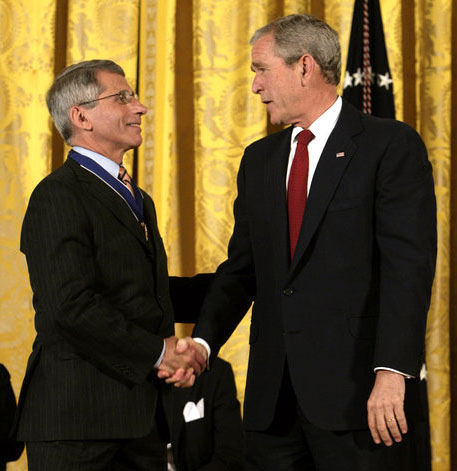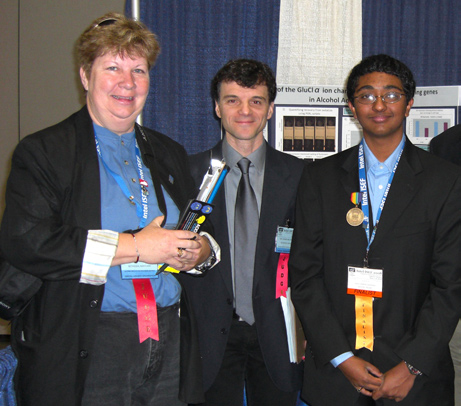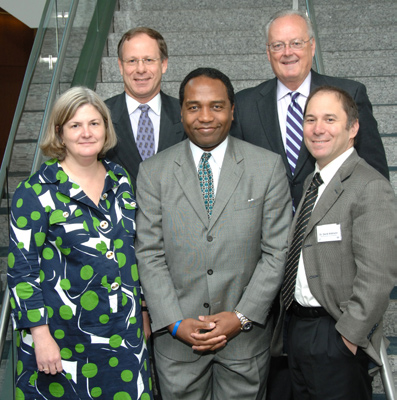cover
previous story
next story
|
 |
 |
Fauci Wins Presidential Medal of Freedom
|
 |
NIAID director Dr. Anthony Fauci (l) was presented with the 2008 Presidential Medal
of Freedom by President George W. Bush on June 19 in the East Room of the White House. The award citation lauded Fauci’s efforts in the fight against HIV/AIDS and “his commitment to enabling men, women, and children to live longer, healthier lives.” The Presidential Medal of Freedom is the nation’s highest civil award. Established by Executive
Order 11085 in 1963, the medal may be awarded by the President “to any person who has made an especially meritorious contribution to the security or national interests of the United States, or world peace, or cultural or other significant public or private endeavors.”
White House Photo: David Bohrer |
NCI’s Trinchieri Wins Milstein Award |
|
Dr. Giorgio Trinchieri, director of the Cancer and Inflammation Program and chief of the Laboratory of Experimental Immunology,
Center for Cancer Research, NCI, has been named the 2008 recipient of the Seymour and Vivian Milstein Award from the International Society of Interferon and Cytokine Research. The award is given annually
to individuals who have made internationally recognized contributions to basic or clinical research related to interferons and cytokines. Trinchieri was honored for his “seminal contributions in the identification
of type I interferon-producing cells and their role in viral clearance and immune responses” and for his discovery and characterization of IL-12 and its functions. The Milstein Award will be presented at the annual meeting of the ISICR in Montreal, Oct. 12-16. |
Three Students Win Addiction Science Award |
 |
| First-place winner Kapil Vishveshwar Ramachandran (r) poses with Dr. Lucinda Miner, deputy director, NIDA Office of Science Policy and Communications, and Dr. Ruben Baler, NIDA scientist. |
For the first time ever, three students received awards for exemplary projects
in addiction science at the world’s largest science competition for high school students—the Intel International Science and Engineering Fair. The new addiction science award is co-sponsored by NIDA and its education partner
Scholastic, the global children’s publishing, education and media company.
This is the first series of Intel awards given exclusively for projects that advance addiction science.
A 16-year-old senior, Kapil Vishveshwar Ramachandran, from Westwood High School in Austin, Tex., received top honors and an award of $2,500 for his project, The Novel Role of the GluCl-alpha; Ion Channel and Diazepam Binding Genes in Alcohol
Addiction, an ambitious
exploration of the basic mechanisms underlying addiction. The young scientist determined that when a specific protein (diazepam
binding inhibitor) is deleted in fruit flies, the flies may lose their tolerance to alcohol. Although the protein had been previously identified, these findings are a strong indication that it may play a role in addiction.
“The judges were particularly impressed with the winner’s enthusiasm and innovative
approach to exploring the neurological underpinnings of addiction,” said NIDA director Dr. Nora Volkow. “He developed a simple, sensitive, elegant instrument to measure tolerance in fruit flies, and ended up possibly contributing
to the knowledge needed to find biological changes at the root of addiction.”
Winning second place and $1,500 was Ethan Garrett Guinn, from Moore High School in Moore, Okla., for his project, Video Games: The Next Generation’s Addiction. The 17-year-old senior chose the topic based on his observation that video games are often used as babysitting tools, yet can lead to obsessive use.
The third place $1,000 award was given to freshman Shelby Marie Raye from Manatee High School in Bradenton, Fla. Her project, What’s In and What’s Out: High Schoolers’ Perceptions of Coolness, identified unique parameters that affect life trajectories and may help scientists better understand peer pressure, a factor in initiation of substance abuse.
“This is the first year we have participated in the Intel competition, so we did not know what to expect,” said head NIDA judge Dr. Lucinda Miner, deputy director
of the Office of Science Policy and Communications. “We were thrilled at the quantity and quality of projects that explored addiction science, which gives us great optimism about the future of this important field.” |
NIDDK Welcomes New Council Members |
 |
| NIDDK director Dr. Griffin Rodgers (c) welcomes new council members (from l) Dr. Nancy Andrews, James Schlicht, Dr. James Freston and Dr. David Altshuler. |
Four new members were recently named to the National Diabetes and Digestive and Kidney Diseases Advisory Council.
Dr. David M. Altshuler is assistant professor of genetics and medicine at Harvard Medical
School and director of medical and population
genetics at the Whitehead Institute/Massachusetts
Institute of Technology’s Center for Genome Research. He studies human genome sequence variation to understand the inherited
basis of common human diseases, especially type 2 diabetes and its complications.
Dr. Nancy C. Andrews, dean and vice chancellor of academic affairs at Duke University School of Medicine, is the first woman to be appointed
dean of Duke’s School of Medicine and the only woman to lead one of the nation’s top 10 medical schools. Her research focuses on iron absorption and its role in hereditary hemochromatosis,
an inherited disease that causes excess accumulation of iron in the body.
Dr. James W. Freston is the Boehringer Ingelheim
chair of clinical pharmacology and professor
emeritus at the University of Connecticut School of Medicine at Farmington. His research interests include the clinical pharmacology of digestive diseases such as acid-related disorders and drug-induced liver injury.
James P. Schlicht is executive vice president and chief government affairs and advocacy officer at the American Diabetes Association, where he is responsible for implementation of the association’s public policy positions. He previously served in the General Accounting Office and the Office of Management and Budget
and was a staff aide to the U.S. House ways and means committee. |
Allen Takes New Post as NIGMS Deputy EO |
|
Kimberly Allen was recently appointed deputy executive officer of NIGMS. In her new position, she works closely with the NIGMS executive officer to manage the institute’s administrative
operations including financial management, information technology and management
analysis. Prior to joining NIGMS in 2005 as a management analyst, Allen worked at the Office of Biotechnology Activities and NCBI as an administrative
specialist, at NCI as an acting administrative officer/administrative assistant and at NIAID as a personnel assistant. Her committee service includes the recruitment reengineering initiative communications
and branding workgroup, NIH ethics advisory committee, Austin Project/IC access committee, deputy ethics counselors/ethics coordinators group and management analyst working group. Allen earned her bachelor’s and master’s degrees from the University of Maryland, Baltimore County. |
Cidlowski
Honored by
Endocrine Society |
|
Dr. John Cidlowski, chief of the NIEHS Laboratory of Signal Transduction and head of the molecular
endocrinology group, was presented with the 2008 Edwin B. Astwood Award at the Endocrine Society’s 90th annual meeting in San Francisco recently. He was one of 11 recipients of ENDO 2008 Laureate Awards, which the society describes as “the pinnacle of achievement in the field of endocrinology.” As part of his award, Cidlowski was invited to present the Astwood Award Plenary Lecture. He spoke on “The Glucocorticoid Receptor: One Gene, Many Proteins—
New Mechanisms for Tissue-Specific Actions of Glucocorticoids.” His major research interests are glucocorticoid receptors and their actions on the inflammatory response triggered by environmental stress via steroid hormone action and the regulation of apoptosis in normal and neoplastic cells. |
 back to top of page back to top of page
|